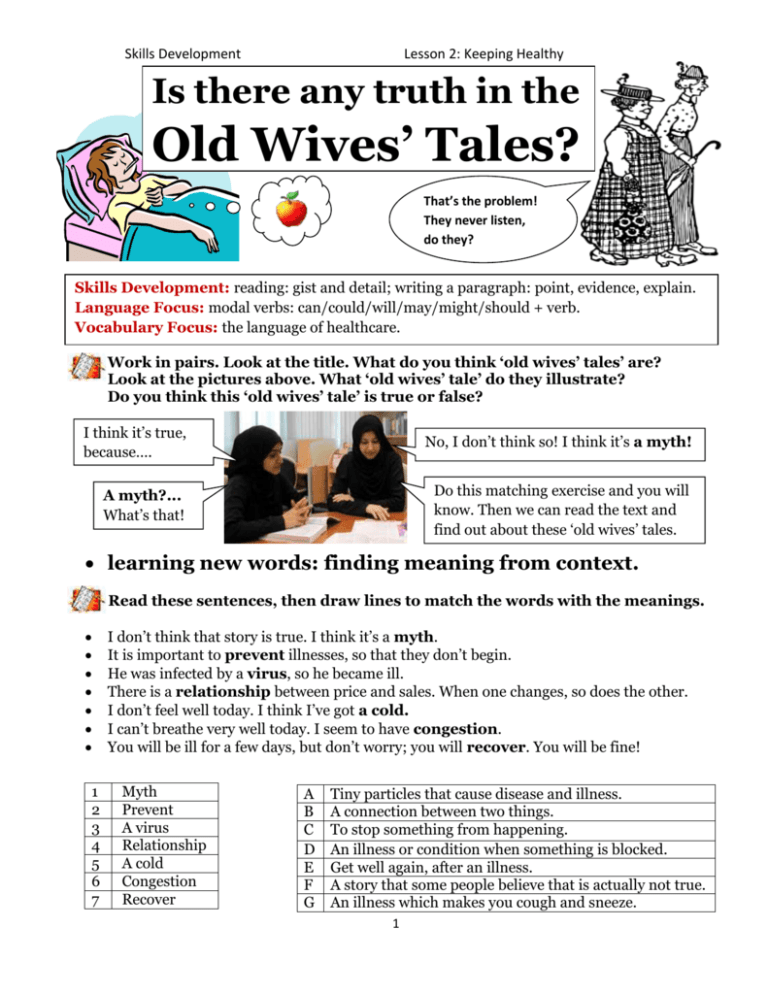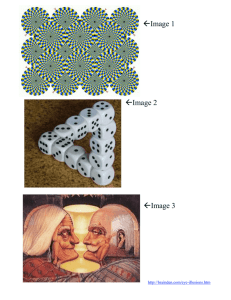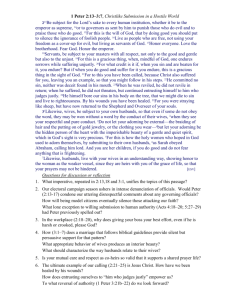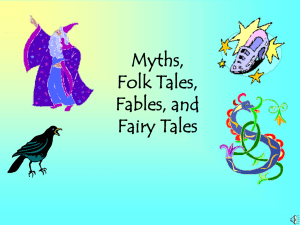Skills Development 2
advertisement

Skills Development Lesson 2: Keeping Healthy Is there any truth in the Old Wives’ Tales? That’s the problem! They never listen, do they? Skills Development: reading: gist and detail; writing a paragraph: point, evidence, explain. Language Focus: modal verbs: can/could/will/may/might/should + verb. Vocabulary Focus: the language of healthcare. Work in pairs. Look at the title. What do you think ‘old wives’ tales’ are? Look at the pictures above. What ‘old wives’ tale’ do they illustrate? Do you think this ‘old wives’ tale’ is true or false? I think it’s true, because…. No, I don’t think so! I think it’s a myth! A myth?... What’s that! Do this matching exercise and you will know. Then we can read the text and find out about these ‘old wives’ tales. learning new words: finding meaning from context. Read these sentences, then draw lines to match the words with the meanings. 1 2 3 4 5 6 7 I don’t think that story is true. I think it’s a myth. It is important to prevent illnesses, so that they don’t begin. He was infected by a virus, so he became ill. There is a relationship between price and sales. When one changes, so does the other. I don’t feel well today. I think I’ve got a cold. I can’t breathe very well today. I seem to have congestion. You will be ill for a few days, but don’t worry; you will recover. You will be fine! Myth Prevent A virus Relationship A cold Congestion Recover A B C D E F G Tiny particles that cause disease and illness. A connection between two things. To stop something from happening. An illness or condition when something is blocked. Get well again, after an illness. A story that some people believe that is actually not true. An illness which makes you cough and sneeze. 1 Skills Development Lesson 2: Keeping Healthy Read these ‘old wives’ tales’ and answer the questions: Does an apple a day keep the doctor away? The ‘old wives’ tale ‘an apple a day keeps the doctor away’ may actually be true. A recent study published in the British Medical Journal found that for people aged over 50, eating apples regularly can prevent or delay heart disease. The study also discovered that apples can prevent other illnesses and medical conditions. Apples are a rich source of antioxidants, flavanoids and fibre which are very beneficial to health and may reduce the risk of cancer, hypertension and diabetes. And with almost no fat or cholesterol, it’s easy to see why “An apple a day” is excellent advice. Can chicken soup cure a cold? The age-old belief that eating chicken soup can help a person recover from a cold is not a myth at all. Dr Stephen Rennard, a professor at the University of Nebraska Medical Centre, carried out experiments with his grandmother's recipe for chicken soup and discovered that it could prevent the spread of white blood cells, called neutrophils, which may cause congestion. In addition to this, the amino acids in chicken meat, together with the peppers that are added can have a very beneficial effect. Overall, the combination of the heat of the soup, the fats, spices, garlic and water can be effective as a treatment for a cold. Does going outside with wet hair cause a cold? The old wives are right! Anyone who goes outside with wet hair has more chance of catching a cold. Until recently, scientists thought there was no relationship between being cold and catching a cold, but research has found a link. Researchers from Cardiff University asked some people to put water on their hair before going outside. Approximately 33% of those people caught colds, compared to just 9% of people without wet hair. Professor Ron Eccles explained, saying, “Chilling of the body surface can cause colds to appear in someone who already has the virus. If they become chilled, this can reduce their defences and can allow the virus to get stronger.” Is it true that eating chocolate causes spots? Good news for chocoholics! The old wives’ tale that eating chocolate causes spots on your skin is actually a myth! The American Academy of Dermatology says acne – spots on the skin - is not caused by any specific type of food, including chocolate. The real causes are dead skin cells, too much natural skin oil and bacteria on the skin. None of these factors are caused by the foods we eat. 2 Skills Development Lesson 2: Keeping Healthy Which one of these sentences is the best summary of the information in the four paragraphs? ___1. Evidence shows that there is quite a lot of truth in many of the so-called ‘old wives’ tales. ___ 2. Research shows that many of the ‘old wives tales’ are just myths. ___ 3. It seems that there is no evidence at all to support these ‘old wives’ tales’; they are just myths. Are these sentences TRUE, FALSE or NOT GIVEN (i.e. there is no information in the texts about this subject)? 1. Eating apples can have significant health benefits for people over 50 years old. ____ 2. Many doctors advise their patients to eat an apple a day. ____ 3. Stephen Rennard’s grandmother’s soup can help cure colds. ____ 4. Evidence shows that garlic causes congestion. ____ 5. Experts used to think that there was no link between being cold and catching a cold. ____ 6. Ron Eccles was surprised by the results of the research. ____ 7. There is good news for people who enjoy eating chocolate. ____ 8. Chocolate can cause acne. ____ Read the paragraph “Does an apple a day keep the doctor away” again. Use different colours to underline or highlight the three parts: point, evidence and explanation. Check in pairs. Do you have the same answers? Look at the information below about the ‘old wives’ tales’. Write a paragraph of at least three sentences, with a point (topic sentence) evidence and explanation. In the explanation you are free to use your own words. Old wives’ tale Facts Carrots contain beta-carotene. Body changes beta-carotene into vitamin A. Vitamin A is very important for eye health. It helps us see. (British Health Society) “Carrots can help you see in the dark!” 3 Skills Development Lesson 2: Keeping Healthy ______________________________________________________ ______________________________________________________ ______________________________________________________ ______________________________________________________ ______________________________________________________ ______________________________________________________ ______________________________________________________ ______________________________________________________ ______________________________________________________ ______________________________________________________ ______________________________________________________ ______________________________________________________ ______________________________________________________ ______________________________________________________ ______________________________________________________ Language Focus: modal verbs: (can/will/may/might) + verb. When we use modal verbs – can, could, will/won’t, would, may, might, shall, should, must - in the active, we only use the verb. No to-, No -ing, No -ed, No -s, Example: I might watch a film=there is a chance. It could prevent illness =it is possible. You should eat carrots =it is better for you. Complete the sentences using one of the words in the box. Example: An apple a day is a good idea, because it might reduce the risk of cancer. may might can will not (won’t) should 1. When you have a cold, you __________________________________________ 2. Eating carrots is a good idea, because it _________________________________ 3. Do not go outside with wet hair, because you______________________________ 4. Don’t worry so much about eating chocolate. It ____________________________ 4 Skills Development Lesson 2: Keeping Healthy Choose one of these ‘old wives’ tales’ and write a paragraph about it. Remember to use can, could, may, might, will/will not (won’t)… Old wives’ tale “I can feel it in my bones!” Rain! Facts Many people have more pain in their joints when the air pressure changes. (Study: Barcelona Institute of Medicine) Pressure changes weather changes. (Relationship) Old wives’ tale “Eating cheese makes you dream!” Facts × Number of dreams - eating cheese - eating other food – no difference. (Study: British Food Association). Dreams: caused by many things. _____________________________________________________ _____________________________________________________ _____________________________________________________ _____________________________________________________ _____________________________________________________ _____________________________________________________ _____________________________________________________ _____________________________________________________ _____________________________________________________ _____________________________________________________ _____________________________________________________ _____________________________________________________ _____________________________________________________ _____________________________________________________ 5








